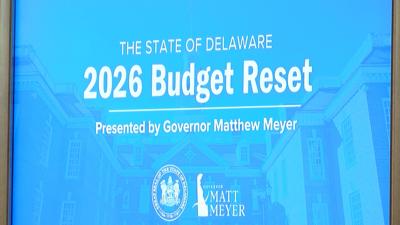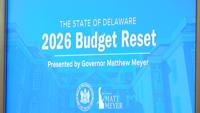DOVER, DE- Governor Matt Meyer unveiled his proposed $6.58 billion budget for fiscal year 2026 on Thursday, focusing on key priorities such as education, housing, and healthcare.
Tax reform is also central to the proposal, introducing three new tax brackets for those earning $125,000, $250,000, and $500,000.
Meyer emphasized that these adjustments aim to ensure more tax fairness in Delaware.
“We're going to be adjusting some tax brackets to make sure the wealthiest Delawareans truly pay their fair share."
However, some lawmakers, like Senator Trey Paradee (D-District 17), expressed concerns that these changes could place a significant burden on middle-class families.
“Setting a bracket as low as $125,000, I think that's going to hit a lot of working families, a lot of middle-class families, pretty hard."
Meyer further explained that the budget aims to reduce taxes for 92% of Delawareans, with those earning under $134,667 in taxable income seeing no increase in their personal income taxes.
Education also received substantial attention in the proposed budget, particularly due to ongoing concerns about student performance.
Meyer stressed the need for action, especially in light of the state’s low test scores and literacy challenges.
“When you look at the reading and math scores in fourth and eighth grade, in our schools, in our public schools, it’s truly not acceptable."
The proposed budget allocates over $119 million for education, including $75.5 million to raise teacher salaries and $8 million for emergency literacy funding.
The budget also addresses Delaware’s housing crisis, dedicating $35.5 million for rental assistance, workforce housing, and downtown development incentives.
However, Representative Lyndon Yearick (R-District 34) questioned the effectiveness of this approach.
“It’s a really subjective term. What affordable means, I think as we focus on creating better-paying jobs, better opportunities for individuals, that makes housing more affordable."
In addition, the budget prioritizes healthcare with a proposed investment of over $176 million, including $85.5 million for Medicaid, $250,000 for a medical school feasibility study, and $1.15 million for a rate increase for mental health professionals in the Division of Substance Abuse and Mental Health.
Governor Meyer acknowledged the uncertainty surrounding federal funding, which could affect the state’s financial outlook.
Senator Paradee echoed these concerns, highlighting the potential consequences of federal cuts.
“If we see significant cuts in Medicaid, that could really hurt our state budget. It could also devastate our nursing homes, our hospitals."
As the state works to finalize its fiscal plans, the Joint Finance Committee will now review the budget in Dover before finalizing everything ahead of the 2026 fiscal year.


